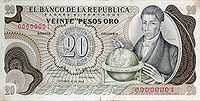Francisco José de Caldas
| Francisco José de Caldas | |
|---|---|
|
Woodcut of Francisco José de Caldas from the Papel Periodico de Bogotá | |
| Born |
Francisco José de Caldas y Tenorio 4 October 1768 Popayán, Viceroyalty of New Granada |
| Died |
28 October 1816 (aged 48) Bogotá, Cundinamarca, United Provinces of New Granada |
Cause of death | Execution by firing squad |
Resting place |
Iglesia de San José Popayán, Cauca, Colombia 2°26′33.68″N 76°36′41.19″W / 2.4426889°N 76.6114417°W |
| Nationality | Neogranadine |
| Other names | El Sabio |
| Ethnicity | Criollo |
| Education | Lawyer |
| Alma mater | Our Lady of the Rosary University |
| Occupation | Botanist, Journalist, Astronomer, Writer |
| Known for | Scientist and Precursor of the Independence of Colombia |
| Religion | Roman Catholic |
| Parent(s) |
José de Caldas y Gamba Vicenta Tenorio y Arboleda |
Francisco José de Caldas (4 October 1768 – 28 October 1816) was a Colombian lawyer, naturalist, and geographer who was executed by orders of Pablo Morillo during the Reconquista for being a precursor of the Independence of New Granada (modern day Colombia).
Biography
Early life
Caldas began his studies in the city of Popayán in the Seminary of Popayán. He later studied in the Colegio del Rosario graduating in Law but was also passionate for mathematics, astronomy and natural sciences.
Expeditionary
Caldas was part of numerous scientific expeditions including the ones with José Celestino Mutis and Alexander von Humboldt. He travelled across the New Kingdom of Granada exploring the newfound land, studying flora, fauna, geography, meteorology and cartography. In 1805 Caldas was appointed by Mutis to direct the Astronomic Observatory.
Revolutionary
Once the revolution of July 20, 1810 occurred, Caldas soon became the editor of the official state newspaper, the Diario Político. Upon Nariño's taking power in Cundinamarca in September 1811, Caldas was drafted as an engineer.
Military
In 1811, Caldas was appointed captain of the brand new Army Corps of Engineers, and by 1812, promoted to lieutenant colonel. In 1813 he was involved with the rebellion against Nariño. After being defeated in the rebellion, Caldas, fearing reprisals, went to Antioquia where he was conferred the rank of colonel and was appointed Director of Arms Factories and Engineer. Between 1813 and 1814, he took charge of the fortifications of the Cauca River and the installation of a rifle and gunpowder factory. In 1815, he was called to take charge of the creation of a military academy in New Granada, and the construction of batteries, trenches, and bridges in the vicinity of the capital. In late 1815, he was sent by José Fernández Madrid to serve in the Army of the North to fortify the roads.
Death
Caldas was captured by the Spanish royalists in 1816 and executed on October 29, in San Francisco Plaza [1] by orders of Pablo Morillo, Count of Cartagena. When Caldas was about to be executed and the people present at the place appealed for the life of the scientist, Morillo responded: "Spain does not need wise people" (Spanish: "España no necesita sabios").[2] Before dying Caldas wrote on the wall a large Greek letter θ, which has been interpreted as exclaiming "Oh long and dark departure!" (Spanish: ¡Oh larga y negra partida![3]
His body was buried in Veracruz Church, which was later turned into the Panteón Nacional (National Pantheon) but later moved to the Panteón de los Próceres in his hometown, Popayán.
Legacy

Caldas helped fund the New Kingdom of Granada Seminary, intended to be a scientific institution during the first decade of the 1800s. In 1810, he founded the Diario Político de Santa Fe Political Diary of Santa Fe which ultimately defended the independentist movement. During this time Caldas became engineer's colonel designing an artillery apparatus for the revolutionaries.
The Colombian department of Caldas is named for Francisco José de Caldas.
The “Francisco José de Caldas” Scholarship for Doctoral Programs is awarded by The Departamento Administrativo de Ciencia, Tecnología e Innovación (Colcienciasis) for Colombians to study toward a PhD.
Books
- "El estado de la geografía del virreinato con relación a la economía y al comercio" (1807)
- "El influjo del clima sobre los seres organizados" (1808)
- "La Memoria sobre la Nivelación de las Plantas del Ecuador, Historia de Nuestra Revolución, Educación de Menores, Importancia del Cultivo de la Cochinilla y Chinchografía y Geografía de los Arboles de Quina
Notes
- ↑ Jesús María Henao; Gerardo Arrubla (1820). Historia de Colombia para la enseñanza secundaria. Librería Colombiana, C. Roldán & Tamayo. p. 350.
- ↑ Universidad Distrital Francisco Jose de Caldas, Francisco José de Caldas (1771 - 1816), retrieved on May 1, 2007
- ↑ Vicente Pérez Silva (December 2010). "Episodios anecdóticos y novelescos de la independencia" [Anecdotal and Fictional Episodes of Independence]. Revista Credencial Historia (in Spanish) (Universidad del Cauca) (252). Fusilamientos del Sabio Caldas y La Pola. Retrieved 21 September 2014.
- ↑ "Author Query for 'Caldas'". International Plant Names Index.
References
- Appel, John Wilton. Francisco José de Caldas: A scientist at work in Nueva Granada. Philadelphia: American Philosophical Society, 1994.
- Glick, Thomas F. Science and Independence in Latin America (with Special Reference to New Granada. The Hispanic American Historical Review, Duke UP, Vol. 71 #2, 5/1991, 307-334.
External links
|
